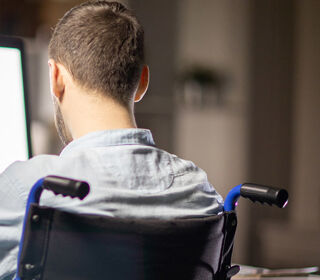
Blog Article

This funded project seeks to make coding more accessible for developers with physical impairments.
People with physical impairments who听may experience challenges in using听traditional input devices (i.e., mouse,听keyboard, and touch) are often excluded from technical professions (e.g.,听software engineering). Alternative input methods such as eye gaze tracking听补苍诲听speech recognition have become听more readily available in recent years, although there has been a lack of work exploring the potential of using听these technologies to make coding more accessible.听
To address this gap, we are exploring the potential of combining multiple alternative methods of input (i.e. gaze interaction, speech recognition, and large mechanical switches) to make coding more accessible for听developers听with physical impairments. This work has resulted in a new development platform听(Voiceye) that听facilitates听multimodal听inputas an approach for writing HTML, CSS, and JavaScript code听(further details are available in听the following听paper:听).
We have also been听investigating听the working practices of听voice coders with physical impairments, as well as听the strengths and limitations of different听multimodal听speech听coding听approaches.听Our paper听on听听provides additional detail around the work we have undertaken in this area.听
Our听longer-term听aim is to create听a customisable development platform that supports people with a range of impairments听(using different input modalities) to write and manage code听efficiently and effectively to a professional standard.听We are also particularly interested in听examining further the听potential for intelligent coding assistants to support disabled developers and how this can听support coding experiences.听
Project Team
- Professor Chris Creed听(Project Lead)
- Bharat Paudyal
- Professor Ian Williams
- Dr Maite Frutos-Pascual
- Dr Sayan Sarcar
Funders
This work has been funded through Microsoft AI for Accessibility and听Google Inclusive Research Program awards.听
Contact
For more information听on the project, contact Professor Chris Creed (chris.creed@bcu.ac.uk).